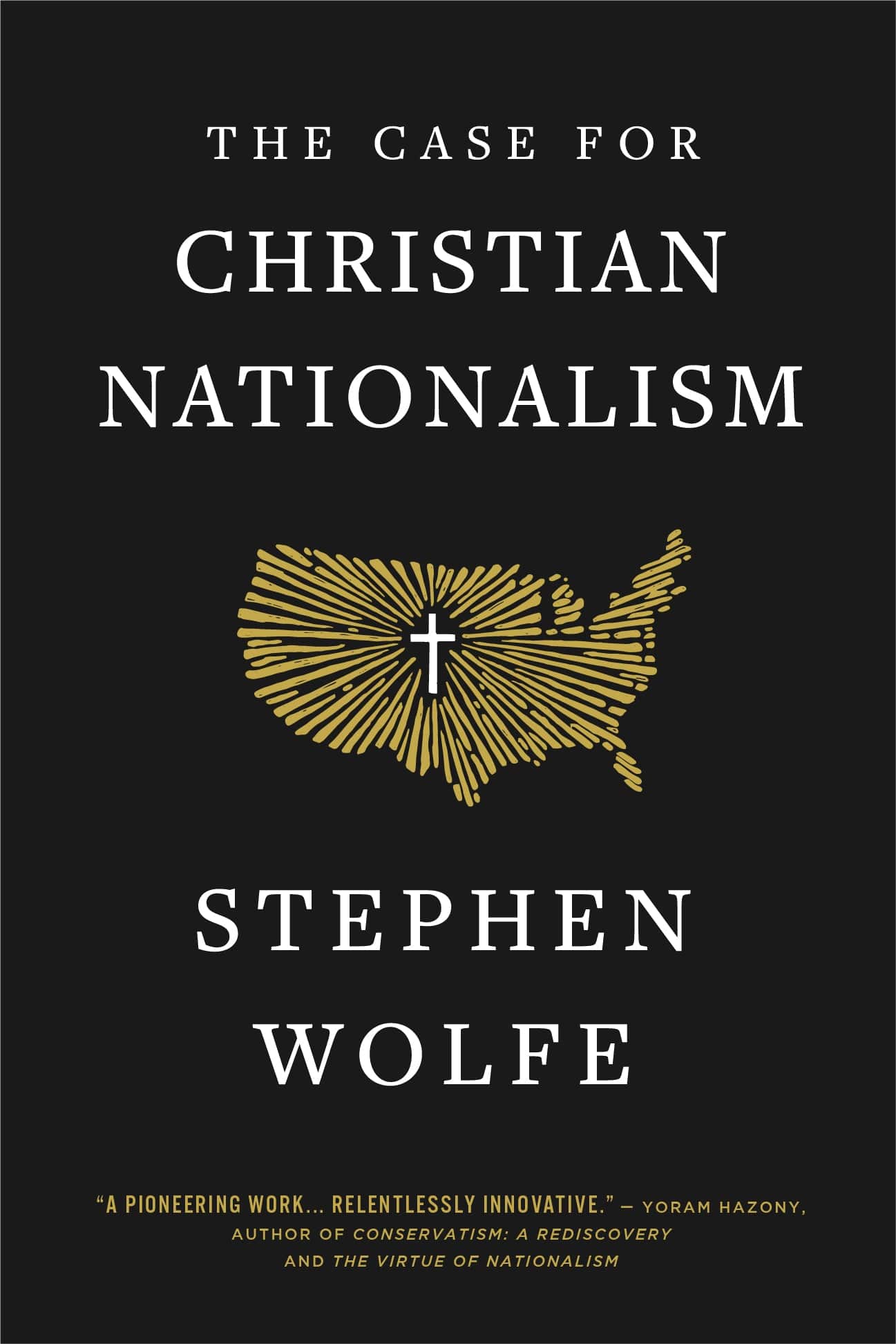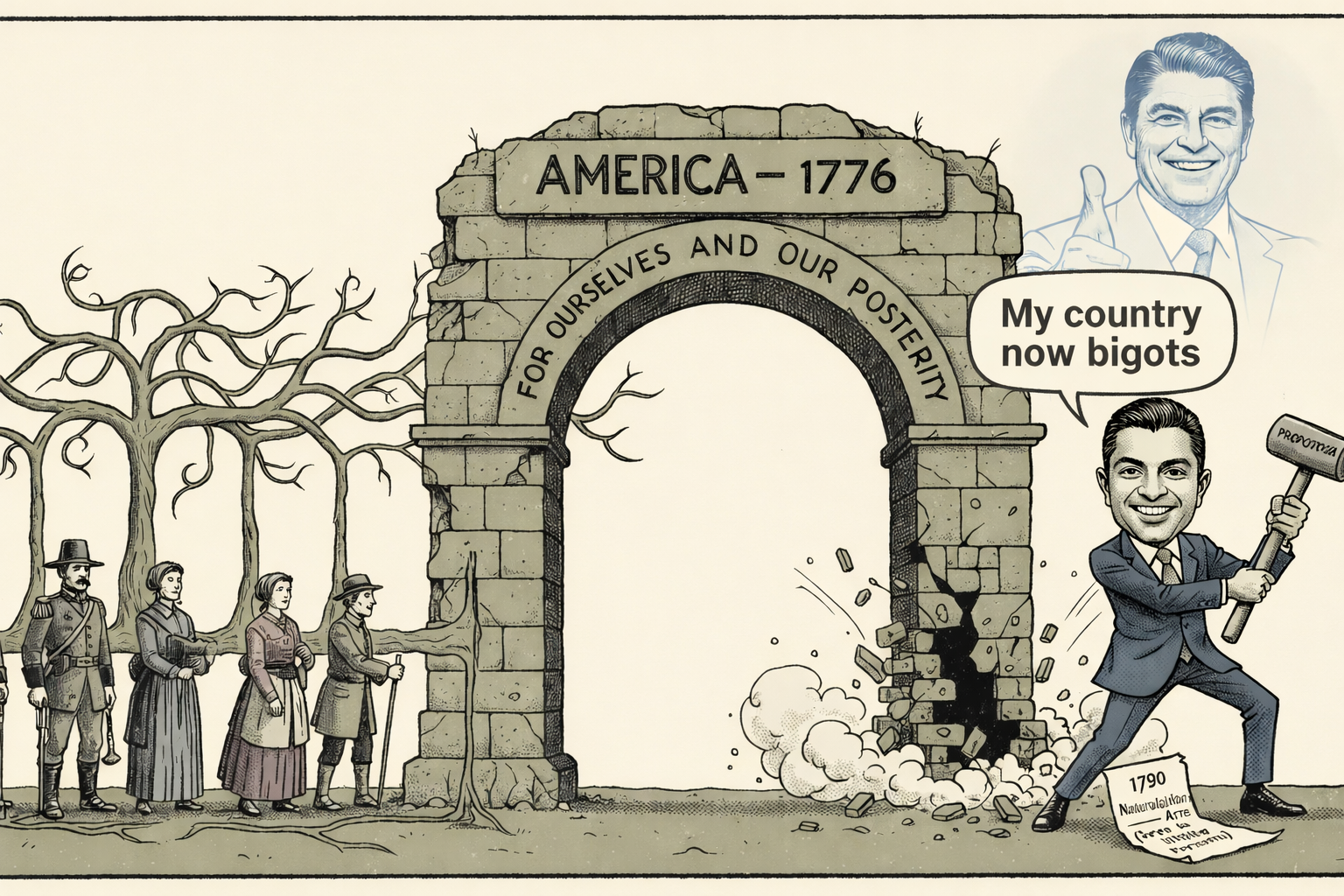The Case For Christian Nationalism by Stephen Wolfe is the definitive argument for both the existence of things called “nations” and for that entity adopting the Christian religion. In September, Andrew Torba and I published Christian Nationalism, and we intended it as a digestible introduction and defense of the movement to renew and recover America’s heritage as a Christian nation. Wolfe, a political scientist with a Ph.D. and fellowship at Princeton, has written a detailed deep dive into the topic. If the book Christian Nationalism, whets your appetite, Wolfe’s 400+ page book, The Case for Christian Nationalism, is the seven-course meal you crave.
What makes Wolfe’s book so important?
Critics of Christian Nationalism constantly decry both “nationalism” and “Christian Nationalism” as idolatrous, unbiblical, tyrannical, “racist,” and undemocratic. But Wolfe gives precise, sustained, and detailed arguments that demonstrate that both “nationalism” and “Christian Nationalism” are positive goods. Take for instance his definition of nationalism:
“Nationalism refers to a totality of national action, consisting of civil laws and social facts (e.g., culture), conducted by a nation as a nation, in order to procure for itself both earthly and heavenly good.”
Wolfe spends nearly 100 pages carefully explaining what each of these three things means, which should lead the reader to recognize as plain as day just how hysterical the critics are.
Is “a nation pursuing its own good as a nation” sinful? Idolatrous? Racist? Tyrannical? Of course not. Substitute any other organized group of human beings and it sounds just as preposterous. “A family pursuing its own good as a family”? “A boy scout troop pursuing its own good as a boy scout troop”? A corporation pursuing its own good as a corporation”? To say these things are idolatrous or sinful would be to say that their very existence is sinful.
In Chapter 3, which alone is worth the price of the book, Wolfe powerfully explains the root of the peculiar phenomenon of ‘the suicide of the modern West’:
“Western man is enamored with his ideology of universality; it is the chief and only ground of his self-regard. His in-group is all people—it is a universal in-group. Everyone is an object of his beneficence. But in perverse fashion he is his own in-group’s out group. The object of his regard is the non-Westerner at the Westerner’s expense—a bizarre self-denigration rooted in guilt and malaise. Loss and humiliation is the point, however. It is euphoric to him; his own degradation is thrilling. This is his psycho-sexual ethno-masochism, the most pernicious illness of the Western mind.”
Wolfe, The Case for Christian Nationalism, pp. 168-169.
Wolfe continues:
“The Western mind needs to be critiqued in order to free it from exploitation and self-disparagement. The key is having the moral and psychological fortitude to endure the psychological discomfort that arise from affirming the truth and denying the false and absurd. Indeed, you must critique and deliberately decline to act on certain mental habits designed to extinguish this discomfort, such as accusations (whether against oneself or others) like “racist” or “fascist” or “xenophobe”; appeals to universality; and ascribing altruism.”
ibid, p. 170.
For generations, Westerners, and Americans in particular, have been catechized to believe 1. that the values unique to their culture are held by all people everywhere throughout all time, and 2. Our national sins are uniquely and incalculably worse than all other peoples and we must assume a posture of guilt. Wolfe points out that until these false habits of mind are eradicated among our people, we will continue to see our nation invaded and our people dispossessed. This degradation leads to cities, institutions, and national identities that our ancestors built over generations, captured and destroyed. In short, it is a chapter that demonstrates that it is okay for Americans to put America first. It is okay for your nation to put its people’s interests as its top priority; it is insane that anyone can make you feel guilty for something natural to every organized group of people everywhere for all of history.
After establishing the idea that a nation pursuing its own earthly and heavenly good is good and right, Wolfe goes on in Chapter 4 to give a defense of the idea of a Christian nation pursuing it’s own earthly and heavenly good. He defends the application of “Christian” as a descriptor against the objection that only individuals and not nations can be saved by pointing out that there are all sorts of organized groups of Christians, especially non-voluntary organized groups like the Christian family. So it stands to reason that there can be nations ordered under the kingship of Jesus Christ and that the civil governments of the nation can act for the nation’s heavenly good.
Wolfe’s 5th and 6th Chapters deal with cultural Christianity and civil law, respectively; subjects that the critics of Christian political engagement (and Christian Nationalism more specifically) often bring up as a sort of “gotcha” argument intended to shut down any serious discussion. But far from a bad thing that causes people to believe they are Christians when they are not, Wolfe defines cultural Christianity as the “…social facticity in the service of the Christian religion. A Christian nation as nation has social power and as a Christian nation this power is directed to Christian ends. Thus Christian nations have a social force that prejudices the people for Christian belief and practice.” (ibid, p. 210)
It is not a question of whether you will have a culture directing people to certain beliefs but rather which culture directs people to certain beliefs. The souls of a nation’s people should have that culture directing them to the truth of God’s Word than it is to have a culture directing them to falsehood and sin.
Compare this perspective to the leading lights of “Big Eva” like Russell Moore, who celebrate the decline of Christianity as a cultural force in America, rejoicing that we don’t have “Mayberry” anymore, because “Mayberry leads to hell just as surely as Gomorrah does.” Wolfe eviscerates this subversive, cowardly, defeatist, glee at the destruction of a once-Christian nation:
Mayberry is the fictional North Carolinian town of The Andy Griffith Show. That show depicts a Southern form of commodious life: a community of few and small concerns, high social trust, and ease of life. The residents had common songs and customs, often singing them together on porches, at times for consolation. They all went to church on Sundays. The children, known by all, ran around town perfectly safe, being protected and watched by the community. Any American who watches that lighthearted, heartwarming show cannot but feel nostalgia for an America lost by negligence and malevolence. But as Moore says, it was “hardly revival.” He prefers “a Roman Empire hostile to the core to” Christianity. In other words, Moore wants society and government that actively destroy communities like Mayberry and use every means to manipulate your children to reject Christ. He doesn’t want mere liberal neutrality, but active hostility.
ibid, pp. 288-289.
The head of the Christian nation, what Wolfe calls “The Christian Prince” is the subject of Chapter 7, and therein he presents the argument for a Christian civil leader who will enact law for the national will and defend and pursue his people’s earthly and heavenly good. And, in this chapter, Wolfe courageously confronts the issue which will prevent great men from assuming the leadership we so desperately need in another paragraph that alone makes the book worth its weight in gold:
Our age suffers from a dearth of great men. This is largely because acquiring power and influence requires one to debase himself with egalitarian appeal. We live under a de facto gynocracy where masculinity is pathologized in the name of “fairness” and “equity.” To achieve acceptance or relevance today, men must become female-adjacent; that is, to adjust to toxic-feminine conditions of empowerment: sameness, credentialism, risk-aversion, victimology, and passive-aggression. Mediocrity today is barely concealed by institution-dependent accolades. Therapy and self-care is praised as an achievement; struggle and self-willed action is deemed toxic. Competition, agonistic assertion, and the pursuit of concrete achievement threaten the egalitarian regime. Instead of analytical thought, viewpoints are backed by institutionally conferred credibility and by threats of managerial-bureaucratic reprisal for disagreement. Everything must be rigged for “equitable” outcomes, which suppresses spontaneous hierarchy formation. Masculinity is enlisted as a means to empower the female objects of empathy (the abstract “marginalized”)—at the man’s expense. As a result, Western nations are leading themselves into decline (especially demographically) as feminine empathy, which is suitable for the domestic sphere, enacts gynocratic contradictions and self-destructive inclusivist policies. We should not ascribe greatness to most of the powerful men of our time; great men lead other men and together direct their nation to its destiny. Great men show that heroic masculinity is not simply about “protecting the weak” but leading the whole to greatness. In civil affairs today, men should go their own way.
ibid, p. 322.
The most controversial chapter by far of Wolfe’s already very polemical book is Chapter 8 “Revolution.” Here Wolfe gives his justification for the people of a nation casting off a tyrannical and unjust government and establishing what he calls a “just and more suitable political arrangement.” In this thorough and detailed argument, Wolfe establishes certain conditions where a revolt against a tyrannical government can be justified.
Consider the father/child relation. The child ought to obey his father within the scope of fatherly order. But if the father were to lose his mind and seek to murder the son, the son is free to resist, seize, and incapacitate his father. In this case, a son indeed resists his father, but the father is subject to resistance not as a father but as a fellow man, and the son resists him but not as a son. In other words, in assaulting his son, the father is not acting fatherly (viz. not acting within the scope of fatherly authority) but as a deranged man, and all deranged men can be resisted. The same is true with the husband/wife and other relations. In each case, the principle is that when some superior acts in ways ill-fitting his office, he acts not as a superior but as a fellow man and, thus, as an equal, albeit under the pretense of superiority and authority. For this reason, the authority can be resisted as an aggressor, though he retains his title as a father, military officer, ship captain, or civic leader.
ibid, p. 327.
In other words, if a dad or a husband can be so abusive that he can be resisted, so can all other human authorities. Wolfe explains precisely what, then, constitutes a tyrant who has abdicated his office by his conduct, “a tyrant in effect is one who, though having the appearance of civil authority, is but a man ordering fellow men to great evil” (p. 330) and he goes on to give a detailed list of arguments defining what conditions meet the definition of tyrannical abuse.
From here Wolfe goes into a discussion of the kind of tyrannical abuse that faces Christians in the modern age, and distinguishes it from the kind of tyranny we have faced in the past:
We are ever-vigilant for that explicit, outward, open, physical, declared, and official persecution. We received this expectation from Christian tradition—a tradition formed in times very different from our own. But we don’t live in the same world as our spiritual forefathers, in the world of Foxe’s Book of Martyrs. The powers of our modern world—the ones that undermined true religion in the West—are more implicit and psychological; they operate in the normalization of secularism. It’s normalization is evident in the fact that “normal” people affirm it, live it, and expect it. Our secularist minds are shaped for it, and thus theological traditions that are clearly opposed to secularism had to be recast as its greatest adherents (e.g., modern two kingdom theology). With our minds enmeshed in the secularist norm, we confidently think that pleading for religious exemptions before secularist overlords is the timeless politics of Jesus. How convenient for us that we happen to live in secularist times.
ibid, p. 337
It is at this point that Wolfe dissects the deepest psychological objection to Christian Nationalism that is so often held by many sincere Christians:
The idea of Christian dominion of public space makes even your typical Christian uncomfortable. When confronted with the accusation of “Christian nationalism,” for example, we retreat to universality. That is, we claim that we want “freedom for all” and that Christian values “benefit everyone equally,” and we point to hospitals, charities, adoptions, and a love for the “outcast.” But this is a mental habit that our spiritual forefathers did not have; they were not habitually trained to retreat to universality, to justify all their claims of public life by making the other the chief beneficiary, nor to make the object of policy all people without discrimination. Nor did they need or seek the approval of the godless to order their communities to God. The retreat to universality is an expression not of Christianity but of normalized modern liberalism, operating as a background assumption for Christian ethics, exegesis, and theology. It ought to be deconstructed.
ibid, p. 338
After answering objections by citing Romans 13 and explaining his position on the lesser magistrate, Wolfe concludes this explosive chapter, not by downplaying his conclusions as the product of meaningless, ivory tower, intellectual blathering, but rather as a call to action. He calls for the same Christian spirit of those who first built Christendom to enliven our hearts and to break free of the psychological chains of secularism.
In Chapter 9, Wolfe answers objections regarding liberty of conscience, stating that the Anglo-American Protestant political and religious tradition that existed in the earliest era of America, which tolerated other religions but did not grant them political power, is a good model to base the ideas of the Christian nationalist project’s view of religious liberty in the future. This leads directly into Chapter 10, which persuasively demonstrates that the American political and religious tradition was that of a thoroughly and explicitly Christian nation. Wolfe masterfully debunks secularist propaganda and outright lies, showing that from initial colonization even to the supposedly “secular” founding of the independent American Republic, was in fact the demonstrable out-working of the Anglo-Protestant religious tradition. Accordingly, the Christian nationalist in America can and should model our project after this heritage we share. America has a particular religious tradition, a tradition that has been subverted over generations by secularists, but a tradition we can and must stand firmly within.
After spending 430 heavily-footnoted pages presenting a thorough, academic case for Christian nationalism, Wolfe concludes with a call to action. In this call to action, he describes what the Christian nationalist is up against, the Globalist American Empire (GAE), the gynocracy that animates the GAE, and all that it will take to overcome it, including and especially overcoming the slavish pathologies beaten into the evangelical mind. Your reward at the end of this feast is the dessert of fervent encouragement. You will reach the end of the book and understand that we have all that we need to win, it just takes action!
Wolfe’s book is precisely what we need at this moment. He is an accomplished scholar and provides exactly the clear, logical, precise arguments that Christian nationalists need to defend Christian engagement in politics that is anything other than the typical automatic surrender to secularism. If you want to bolster your understanding of Christian political engagement and if you want to be heavily armed with every possible argument those who demand your surrender will muster, you absolutely must read this book.

Andrew Isker is the pastor of 4th Street Evangelical Church in Waseca, MN. He is a graduate of Minnesota State University and Greyfriar’s Hall Ministerial Training School, and he has served churches in Missouri, West Virginia, and Minnesota. He is the author (with Andrew Torba) of Christian Nationalism, and the author of the forthcoming book, The Boniface Option. Andrew, his wife Kara, and their five children reside in his hometown of Waseca, MN. He can be found on Gab @BonifaceOption.





